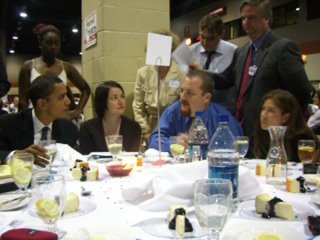I'm in DC. On behalf of the
Ohio Digital Divide Working Group, I'm talking to legislator's staffers about broadband access, digital literacy, and the
COPE Act (ie. telecom bill). When discussing the COPE Act, I bring up the current lack of build out requirements, the faint net neutrality language, the bill's support for community networks and the evaporating source of community technology funding in Ohio. This is what I say...
Lack of Build out RequirementsThe bill as is, allows phone companies to choose where to provide fiber (with the purposes of providing video on demand). The argument is that this will increase competition. Telecoms are beholden to their shareholders. Where do you suppose they will place the fiber? If no incentive is given to encourage them to build out the networks in less profitable areas (that is low income and rural), we have no reason to believe those areas will ever receive the fiber. In order to provide low cost competition in a wealthy neighborhood, how do you think the company will recover their cost? 10-1 the answer is to recover the cost through their other services that are provided in all neighborhoods (phone, DSL). So the result is that the poor will be subsidizing the high speed fiber of the rich.
We need to encourage equitable build out of fiber within a city (cable did it and is still making a profit... we know it can be done). A separate but related issue is the lack of broadband in rural areas. It is reasonable to ask telecoms to build out in a less profitable neighborhood within the same city that they just laid fiber for in a profitable neighborhood. Not as reasonable is to tell them to also lay fiber in rural America. We need to find a way to encourage broadband expansion in rural areas. This means we need to be creative. Some of this may happen in the COPE Act. Some of it may happen elsewhere. Either way, it still needs to be discussed.
Possible ideas -
1. Utilizing the
Universal Service Fund for increased rural broadband deployment (which may require increasing the funding USF receives);
2. Make sure communities have the right to create their own community networks;
3. Open up state owned fiber networks to private ISPs, munipalities, regional coalitions, community organizations and any others who want to use the fiber network as a backbone for a new broadband network (possibly include language in the telecom bill to support a state's right to open up their network); and
4. Not related to the telecom bill --- Improve the
USDA Rural Telecom Program which is currently too cumbersome and reliant upon matching funds which discourages applicants.
Faint Network Neutrality LanguageThe COPE Act barely gives support to network neutrality. We have a level playing field on this amazing instrument we call the Internet. Why would we allow discrimination? The telecoms say giving them the right to form partnerships and offer "improved" services to certain partners is not discriminatory. But anytime preferential treatment is given, others are left behind. Who will be left behind? Smaller content providers (which most brick and mortar companies are these days) and consumers. Most organized intelligent effort on this issue is
Save the Internet of which
OCCN is a charter member.
Support for Community Right to Network
The COPE Act does support a community's right to network, or in other word's a state cannot take away the right from a municipality or community organization looking to form their own network. We just need to watch to make sure this portion of the COPE Act, usually refered to as Title 4, actually stays in the bill.
Evaporating Source of Community Technology Funding In OhioCommunity technology in Ohio has received the bulk of its funding from
agreements between the Public Utilities Commission of Ohio (PUCO) and the telecoms. With deregulation the current focus of the PUCO, we do not expect any additional agreements to result in community technology funding. Cleveland City Council negotiated a lump sum of $3 million from Adelphia to fund the
Neighborhood Technology Fund in the 2000 agreement between the City and Adelphia. The current COPE Act provides national franchising rights which translates into no negotiating between the city and cable provider (be it a cable company or telecom). So, with current funding streams dried up, we need a new solution for funding community technology in Ohio.
Possible ideas -
1. Provide Digital Inclusion funding via the Universal Service Fund (would most likely require additional moneys go to the fund)
2. In addition to the set asides for the local governments and PEG, cable and telecom providers would also set aside 1% of revenue for local Digital Inclusion programs.
The
National League of Cities has come out against the COPE Act. They have an
excellent one pager that includes bullets on where the telecoms will provide this "competition". Ah yes, finally, we are not the only ones talking about equitable build out issues.


